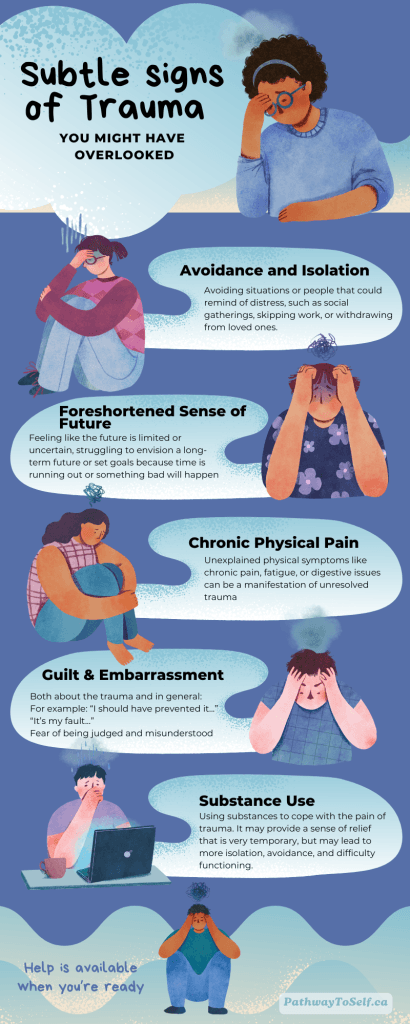Trauma often reveals itself in ways that are not immediately apparent.
Many people may not think that some aspects of our distress are related to trauma.
Often, these subtle signs of distress do indicate trauma, and can be quite entrenched in our everyday lives.
For those who may be living with these issues, and may not know about their origins or meanings, I decided to write this article.
Here are some of the subtle signs of trauma that you might come across:
1. Avoidance and Isolation
Trauma survivors might take extreme measures to avoid situations or people that could remind them of their distress. This can manifest as avoiding social gatherings, skipping work, or withdrawing from loved ones.
Their avoidance is often a way to shield themselves from emotional pain, which can sometimes be mistaken for disinterest or rudeness. Offering a compassionate and non-judgmental presence can help them feel safe enough to gradually reconnect.
2. Sense of Foreshortened Future
A sense of foreshortened future is a common symptom in trauma survivors, where individuals feel that their future is limited or uncertain.
They might struggle to envision a long-term future or set goals because they feel as if their time is running out or that something bad is always looming. This perspective can significantly impact their motivation and outlook on life.
3. Misplaced Connection
Trauma’s effects don’t always appear immediately. Sometimes, symptoms such as anxiety, depression, or panic attacks can surface long after the traumatic event. This delay can make it challenging to link current struggles with past experiences, leading to confusion and frustration.
Acknowledging that symptoms can develop over time helps in understanding that the individual’s reactions are valid, even if they seem disconnected from the initial trauma.
4. Reluctance to Seek Help
Some people with trauma may believe that asking for help signifies weakness or inadequacy. They might prefer to handle their struggles independently, fearing that seeking support could lead to judgment or expose them to vulnerabilities.
Encouraging a supportive dialogue and normalizing the need for help can assist in overcoming this reluctance, reinforcing that seeking support is a strength, not a weakness.
5. Feelings of Guilt
Guilt is a common and complex emotion for trauma survivors. They might experience survivor’s guilt, feeling they should have prevented the trauma, or self-blame, believing they are somehow responsible for what happened.
This guilt can make it difficult for them to seek help or acknowledge their pain. Validating these feelings and providing reassurance that their reactions are normal can help in addressing these deeply ingrained beliefs.
If you’ve found this information useful, here are some questions you might ask yourself (or help others ask themselves). Asking these questions can help shed light on what the trauma experience looks like for us, personally, and how it is different from others:
- How could spotting these signs in yourself or others change how you seek or offer support?
- What small steps can you take today to address any trauma-related behaviors or feelings you might have noticed?
- How can knowing these subtle signs of trauma affect how you interact with friends or loved ones who might be struggling?
- What kind of support or resources would help you or someone you care about deal with these trauma signs?







